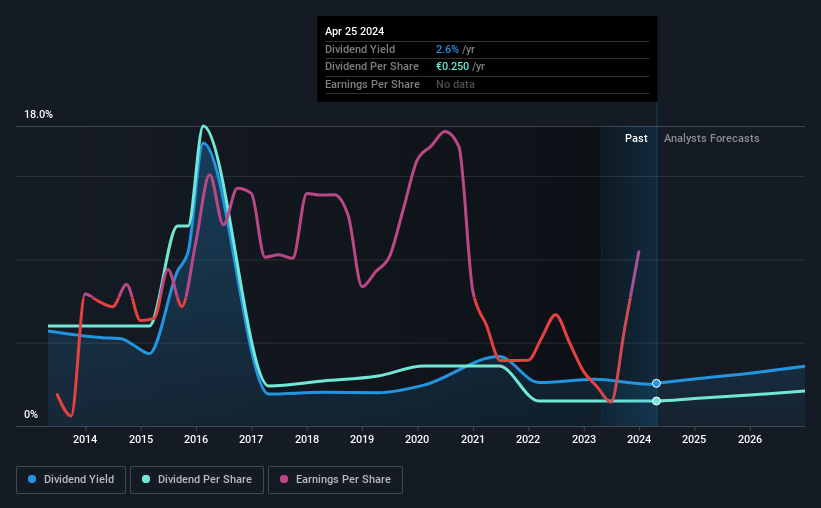Stock Analysis
There's A Lot To Like About Vivendi's (EPA:VIV) Upcoming €0.25 Dividend

Vivendi SE (EPA:VIV) stock is about to trade ex-dividend in three days. Typically, the ex-dividend date is one business day before the record date which is the date on which a company determines the shareholders eligible to receive a dividend. The ex-dividend date is important because any transaction on a stock needs to have been settled before the record date in order to be eligible for a dividend. Thus, you can purchase Vivendi's shares before the 30th of April in order to receive the dividend, which the company will pay on the 3rd of May.
The company's upcoming dividend is €0.25 a share, following on from the last 12 months, when the company distributed a total of €0.25 per share to shareholders. Calculating the last year's worth of payments shows that Vivendi has a trailing yield of 2.6% on the current share price of €9.764. We love seeing companies pay a dividend, but it's also important to be sure that laying the golden eggs isn't going to kill our golden goose! We need to see whether the dividend is covered by earnings and if it's growing.
Check out our latest analysis for Vivendi
Dividends are typically paid out of company income, so if a company pays out more than it earned, its dividend is usually at a higher risk of being cut. Vivendi paid out 59% of its earnings to investors last year, a normal payout level for most businesses. Yet cash flows are even more important than profits for assessing a dividend, so we need to see if the company generated enough cash to pay its distribution. Fortunately, it paid out only 48% of its free cash flow in the past year.
It's positive to see that Vivendi's dividend is covered by both profits and cash flow, since this is generally a sign that the dividend is sustainable, and a lower payout ratio usually suggests a greater margin of safety before the dividend gets cut.
Click here to see the company's payout ratio, plus analyst estimates of its future dividends.

Have Earnings And Dividends Been Growing?
Companies with consistently growing earnings per share generally make the best dividend stocks, as they usually find it easier to grow dividends per share. If earnings fall far enough, the company could be forced to cut its dividend. That's why it's comforting to see Vivendi's earnings have been skyrocketing, up 34% per annum for the past five years. The current payout ratio suggests a good balance between rewarding shareholders with dividends, and reinvesting in growth. With a reasonable payout ratio, profits being reinvested, and some earnings growth, Vivendi could have strong prospects for future increases to the dividend.
The main way most investors will assess a company's dividend prospects is by checking the historical rate of dividend growth. Vivendi's dividend payments per share have declined at 13% per year on average over the past 10 years, which is uninspiring. Vivendi is a rare case where dividends have been decreasing at the same time as earnings per share have been improving. It's unusual to see, and could point to unstable conditions in the core business, or more rarely an intensified focus on reinvesting profits.
The Bottom Line
Is Vivendi worth buying for its dividend? We like Vivendi's growing earnings per share and the fact that - while its payout ratio is around average - it paid out a lower percentage of its cash flow. Vivendi looks solid on this analysis overall, and we'd definitely consider investigating it more closely.
With that in mind, a critical part of thorough stock research is being aware of any risks that stock currently faces. Case in point: We've spotted 1 warning sign for Vivendi you should be aware of.
A common investing mistake is buying the first interesting stock you see. Here you can find a full list of high-yield dividend stocks.
Valuation is complex, but we're helping make it simple.
Find out whether Vivendi is potentially over or undervalued by checking out our comprehensive analysis, which includes fair value estimates, risks and warnings, dividends, insider transactions and financial health.
View the Free AnalysisHave feedback on this article? Concerned about the content? Get in touch with us directly. Alternatively, email editorial-team (at) simplywallst.com.
This article by Simply Wall St is general in nature. We provide commentary based on historical data and analyst forecasts only using an unbiased methodology and our articles are not intended to be financial advice. It does not constitute a recommendation to buy or sell any stock, and does not take account of your objectives, or your financial situation. We aim to bring you long-term focused analysis driven by fundamental data. Note that our analysis may not factor in the latest price-sensitive company announcements or qualitative material. Simply Wall St has no position in any stocks mentioned.
About ENXTPA:VIV
Vivendi
Vivendi SE operates as an entertainment, media, and communication company in France, the rest of Europe, the Americas, Asia/Oceania, and Africa.
Good value with reasonable growth potential.

